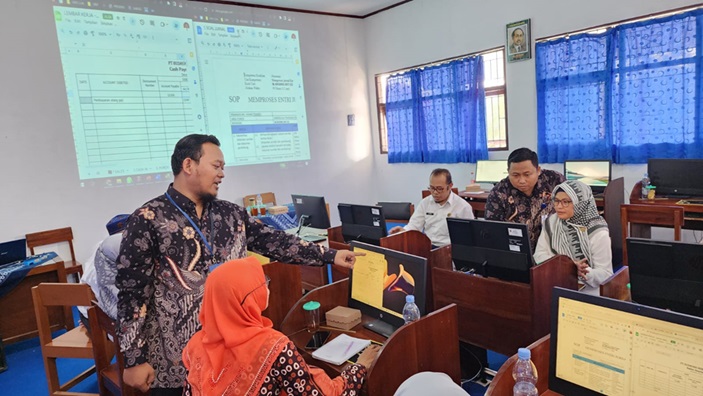Pemanfaatan Teknologi Informasi untuk Meningkatkan Kemampuan Penyusunan Laporan Keuangan Berbasis Digital bagi Guru MGMP Akuntansi SMK di Kabupaten Kulon Progo Utilization of Information Technology to Improve the Ability to Prepare Digital-Based Financial Statements for Vocational Accounting MGMP Teachers in Kulon Progo Regency
Main Article Content
Abstract
Along with the development of the increasingly massive digital era, technological skills have become very important for every profession, including accounting teachers. Accounting teachers need to have the ability to compile digital-based financial statements because they are at the forefront of preparing accounting graduates who will compete in the professional and modern world of work. Analysis of the situation shows that the teacher of MGMP Accounting SMK Kulon Progo. The participants of the PkM activity were 21 teachers of MGMP Accounting for SMK Kulon Progo Regency. The steps of PKM activities are 1) the urgency of the ability to prepare digital-based financial statements for teachers 2) the practice of preparing journals and ledgers with Microsoft Excel, 3) the practice of preparing adjustment journals and financial statements with Microsoft Excel, 4) direction and technical explanation for the assignment of independent worksheet work, 5) independent work by teachers for 2 weeks, 6) presentation of independent work, and 7) dedication to reviewing the practical task of preparing digital-based financial statements. The result of PKM activities is the increasing ability of accounting teachers to compile digital-based financial statements. The achievement of PkM results is supported by several factors, namely the solidity of the service team, cooperation agreements between the service team and partners, smooth communication between the service team and partners, and the suitability of training materials with the needs of target partners.
Downloads
Article Details

This work is licensed under a Creative Commons Attribution-ShareAlike 4.0 International License.
Authors who publish with this journal agree to the following terms:
- Any article on the copyright is retained by the author(s).
- Author grant the journal, right of first publication with the work simultaneously licensed under a Creative Commons Attribution License that allows others to share work with acknowledgment of the work authors and initial publications in this journal.
- Authors are able to enter into a separate, additional contractual arrangements for non-exclusive distribution of published articles of work (eg, post-institutional repository) or publish it in a book, with acknowledgment of its initial publication in this journal.
- Authors are permitted and encouraged to post their work online (e.g., in institutional repositories or on their websites) prior to and during the submission process, as can lead to productive exchanges, as well as earlier and greater citation of published work.
- The article and any associated published material is distributed under the Creative Commons Attribution-ShareAlike 4.0 International License
References
Albrecht, W. S., Sack, R. J., & Van Esch, J. (2019). Accounting education at a crossroads. Routledge.
Alfawareh, H. M., Alzubi, A., Aldossari, B., & Jaradat, R. M. (2019). The impact of using accounting information systems on the quality of financial statements. International Journal of Accounting Information Systems, 34, 100411.
Aspi, M., & Syahrani, S. (2022). Profesional Guru Dalam Menghadapi Tantangan Perkembangan Teknologi Pendidikan. Adiba: Journal of education, 2(1), 64-73.
Ball, R., Jayaraman, S., & Shivakumar, L. (2012). Audited financial reporting and voluntary disclosure as complements: A test of the confirmation hypothesis. Journal of Accounting and Economics, 53(1), 136-166.
Clark-Wilson, A., Robutti, O. & Thomas, M. (2020) Teaching with digital technology. ZDM Mathematics Education 52, 1223–1242. https://doi.org/10.1007/s11858-020-01196-0
Deumes, R. (2019). Factors influencing financial reporting quality in European countries. Journal of International Accounting, Auditing, and Taxation, 36, 26-42. https://econpapers.repec.org/scripts/redir.pf?u=https%3A%2F%2Fdoi.org%2F10.1016%252Fj.jacceco.2011.11.005;h=repec:eee:jaecon:v:53:y:2012:i:1:p:136-166
Epstein, B. J., & Jermakowicz, E. K. (2016). Wiley GAAP 2017: Interpretation and Application of Generally Accepted Accounting Principles. John Wiley & Sons.
Gibson, C. H. (2017). Financial Reporting and Analysis: Using Financial Accounting Information (14th ed.). Cengage Learning.
Hamta, F., & Putri, R. S. A. (2019). Pengaruh kecanggihan teknologi informasi, partisipasi manajemen dan kemampuan teknik pemakai sistem informasi akuntansi pada kinerja individu karyawan PT. Batamec. Measurement: Journal of the accounting study program, 13(2), 156-163. https://doi.org/10.33373/mja.v13i2.2181
Knechel, W. R., Niemi, L., & Zerni, M. (2016). Audit and assurance services: An integrated approach. Pearson.
Markelevich, I. (2018). Applying business intelligence tools to optimize financial reporting in complex global companies. Journal of Corporate Accounting & Finance, 29(1), 74-82. http://dx.doi.org/10.5267/j.uscm.2023.7.002
Mladenović, M. N., Petrović, D., & Lukić, R. (2019). Education 4.0 in Accounting: Challenges and Perspectives. Procedia-Social and Behavioral Sciences, 220, 108-115. https://doi.org/10.2991/aebmr.k.200415.005
Mulyadi, S., Surya, A., & Djakman, C. D. (2019). Accounting education 4.0: A conceptual paper. SSRN Electronic Journal.
Rittenberg, L. E., Martens, S. C., & Kell, W. G. (2017). Auditing: A Business Risk Approach. Cengage Learning.
Seda, Y., & Selamat, M. H. (2018). Big data analytics in accounting: A systematic literature review. Journal of King Saud University-Computer and Information Sciences.
Suryadi, S. (2015). Peranan perkembangan teknologi informasi dan komunikasi dalam kegiatan pembelajaran dan perkembangan dunia pendidikan. Informatika, 3(3), 133-143. https://doi.org/10.36987/informatika.v3i3.219
Triteeraprapab, S., & Techanitisawad, W. (2017). Big data analytics: A review of theoretical frameworks, tools, and applications. Human-centric Computing and Information Sciences, 7(1), 23. http://dx.doi.org/10.4018/978-1-7998-6673-2.ch001
Vaassen, E. H. J. (2018). The role of data analytics in corporate reporting quality: Evidence from restatements. European Accounting Review, 27(5), 889-915. http://dx.doi.org/10.1007/978-3-031-46177-4_22
Van Esch, J., Albrecht, W. S., & Sack, R. J. (2019). Big data and the transformation of the accounting profession. Journal of Emerging Technologies in Accounting, 16(1), 87-106. http://dx.doi.org/10.17485/ijst/2020/v13i08/149808
Vasarhelyi, M. A., Alles, M. G., & Kogan, A. (2018). Continuous monitoring and continuous auditing: From idea to implementation. Journal of Information Systems, 32(1), 3-34. http://dx.doi.org/10.11591/ijece.v13i1.pp796-808
Ward, T. B. (2018). Bridging the gap: Preparing accountants to use artificial intelligence. The CPA Journal, 88(11), 48-53.
Zamzami, F., Nusa, N. D., & Faiz, I. A. (2021). Sistem informasi akuntansi. Yogyakarta: UGM Press.
